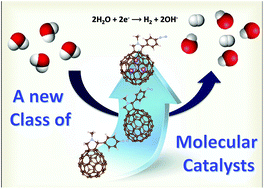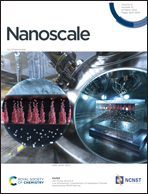Diazonium functionalized fullerenes: a new class of efficient molecular catalysts for the hydrogen evolution reaction†
Abstract
Considerable efforts are being made to find cheaper and more efficient alternatives to the currently commercially available catalysts based on precious metals for the Hydrogen Evolution Reaction (HER). In this context, fullerenes have started to gain attention due to their suitable electronic properties and relatively easy functionalization. We found that the covalent functionalization of C60, C70 and Sc3N@IhC80 with diazonium salts endows the fullerene cages with ultra-active charge polarization centers, which are located near the carbon-diazonium bond and improve the efficiency towards the molecular generation of hydrogen. To support our findings, Electrochemical Impedance Spectroscopy (EIS), double layer capacitance (Cdl) and Mott–Schottky approximation were performed. Among all the functionalized fullerenes, DPySc3N@IhC80 exhibited a very low onset potential (−0.025 V vs. RHE) value, which is due to the influence of the inner cluster on the extra improvement of the electronic density states of the catalytic sites. For the first time, the covalent assembly of fullerenes and diazonium groups was used as an electron polarization strategy to build superior molecular HER catalytic systems.



 Please wait while we load your content...
Please wait while we load your content...
